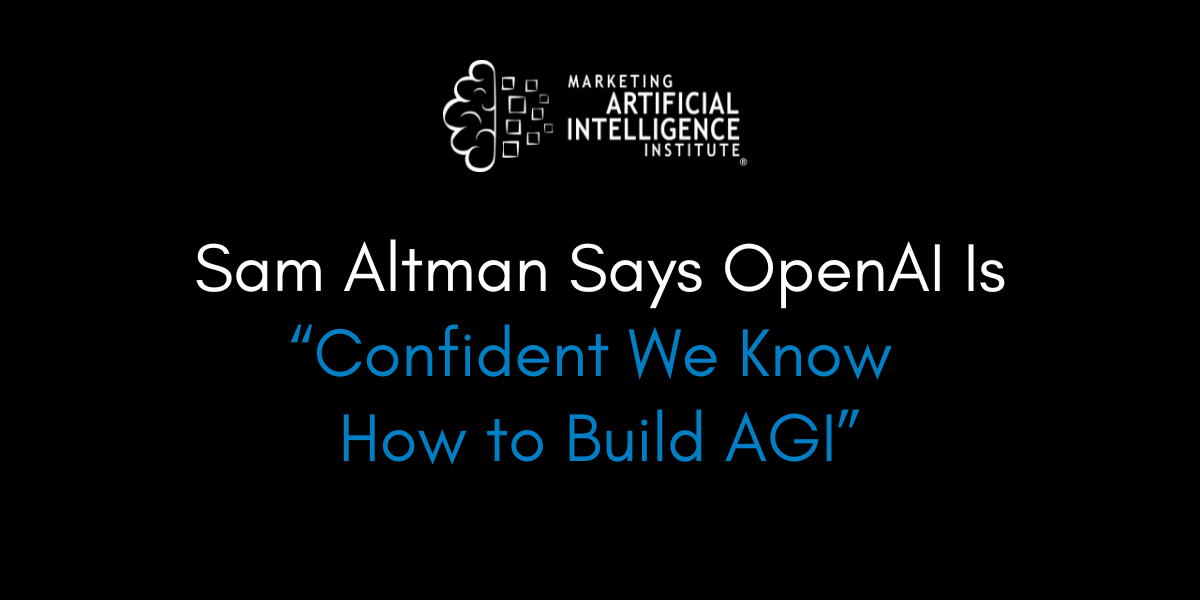Sam Altman, CEO of OpenAI, just took his vision for artificial intelligence to a whole new level—and made it very clear he’s not worried if people call it science fiction.
Altman published a new essay titled Reflections where he wrote: "We are now confident we know how to build AGI as we have traditionally understood it."
He followed that up with some eyebrow-raising comments in an interview with Bloomberg, where he reiterated his belief that AGI is near. He then took it a step further, suggesting that the real prize is superintelligence—and it’s coming sooner than most of us think.
If it all sounds wild, Altman isn’t surprised. And believes OpenAI will be vindicated in the end.
“We're pretty confident that in the next few years, everyone will see what we see," he writes in Reflections.
So, how did we get from "maybe AGI someday" to "we’re confident we can build it now?"
I broke it all down with Marketing AI Institute founder and CEO Paul Roetzer on Episode 130 ofThe Artificial Intelligence Show.
Altman’s Perspectives on AGI, Superintelligence, and Agents
Between the Reflections essay and the Bloomberg interview, Altman hits on a few key points that are worth keeping in mind, says Roetzer.
- AGI… but what is it exactly? In “Reflections,” Altman says OpenAI knows how to build it. Yet in the interview, he calls AGI a “sloppy term” and admits the company moves the goalposts. That’s left some observers scratching their heads over how, exactly, OpenAI defines AGI.
- Superintelligence in sight. Altman sees superintelligence (beyond human-level AI) driving huge gains in scientific discovery and innovation. While it may sound fantastical, he insists everyone else will soon see what he sees.
- AI agents in the workforce. He’s adamant that 2025 is when we’ll really see AI agents change how organizations operate—though there’s some healthy skepticism about how autonomous or reliable these agents will actually be.
Why the Sudden Shift?
Altman says he remembers pitching AGI back in 2014 and getting sideways looks from potential hires and peers.
"It's impossible to overstate how nonmainstream AGI was way back in 2014," Altman told Bloomberg. "People were afraid to talk to me, because I was saying I wanted to start an AGI effort. It was like, cancelable. It could ruin your career.”
Now, less than a decade later, AGI is front-page news.
Why the sudden shift?
Paul Roetzer points to the rapid progress of these models as a key driver.
“I think the models have gotten smarter,” says Roetzer. “That's changed.”
OpenAI’s breakthroughs (and those of competitors) have transformed the conversation from “if AGI is possible” to “how soon will it arrive?”
In fact, Altman believes that the first major AI agents will start showing up in businesses this year.
Roetzer thinks that's possible—especially for AI-heavy organizations that are already innovating at the frontier. But “fully autonomous” is still a stretch.
“I do think you’ll see agent-like systems carrying out strings of tasks,” says Roetzer. “But there’s going to be a lot of human involvement, especially early on—people setting up workflows, overseeing and correcting the AI, and making sure it’s not accessing what it shouldn’t. They’ll be real, but far from perfect.”
The Bottom Line
Sam Altman has never been shy about making bold predictions, but his latest statements—coupled with behind-the-scenes stories on recruiting top AI minds—signal that OpenAI is serious about accelerating toward AGI and superintelligence.
Is it hype? Possibly.
Is it happening faster than many expected? Absolutely.
If you’re working in any forward-thinking organization, it’s time to track these developments closely. Whether Altman’s 2025 agent prediction comes true or not, something big is on the horizon—and businesses that ignore the drumbeat of change risk being left in the dust.
Mike Kaput
As Chief Content Officer, Mike Kaput uses content marketing, marketing strategy, and marketing technology to grow and scale traffic, leads, and revenue for Marketing AI Institute. Mike is the co-author of Marketing Artificial Intelligence: AI, Marketing and the Future of Business (Matt Holt Books, 2022). See Mike's full bio.



